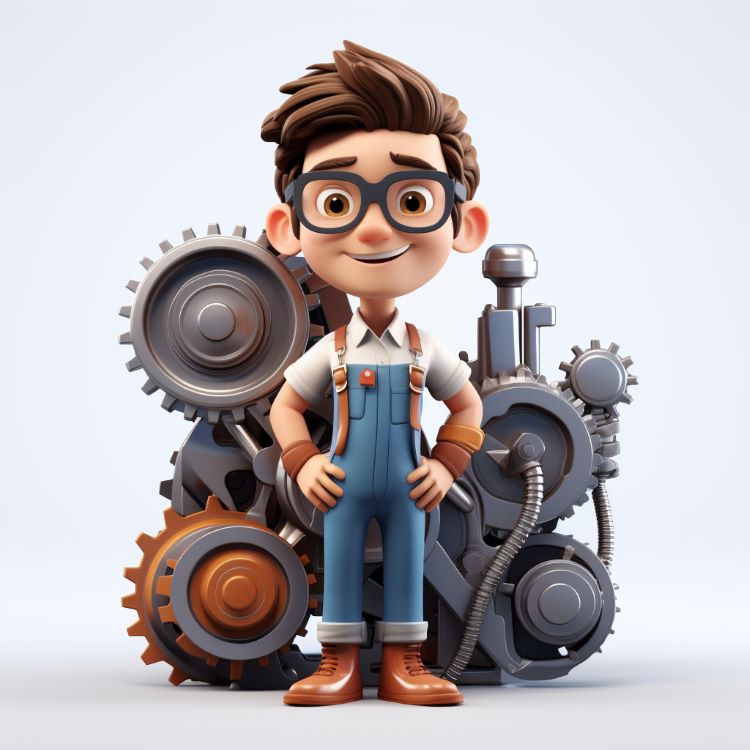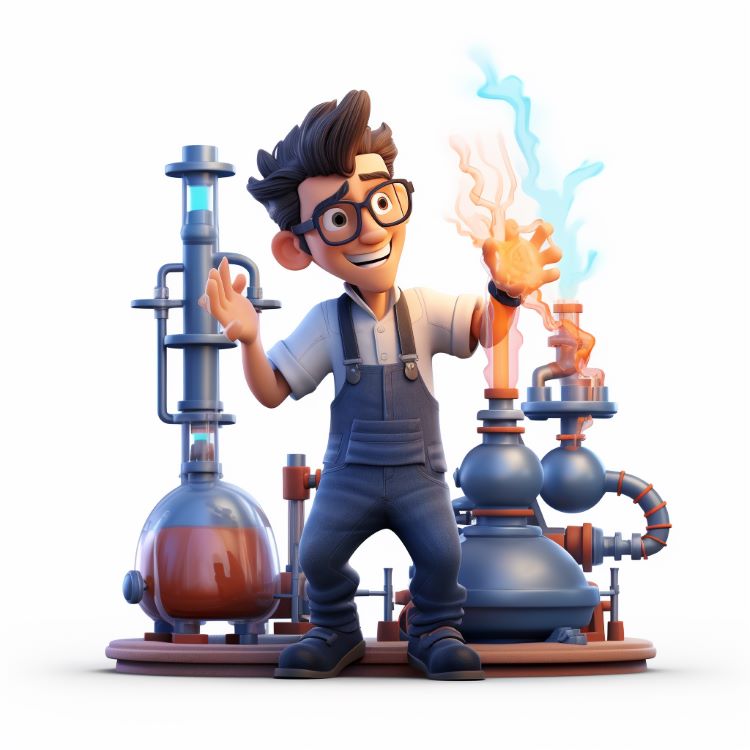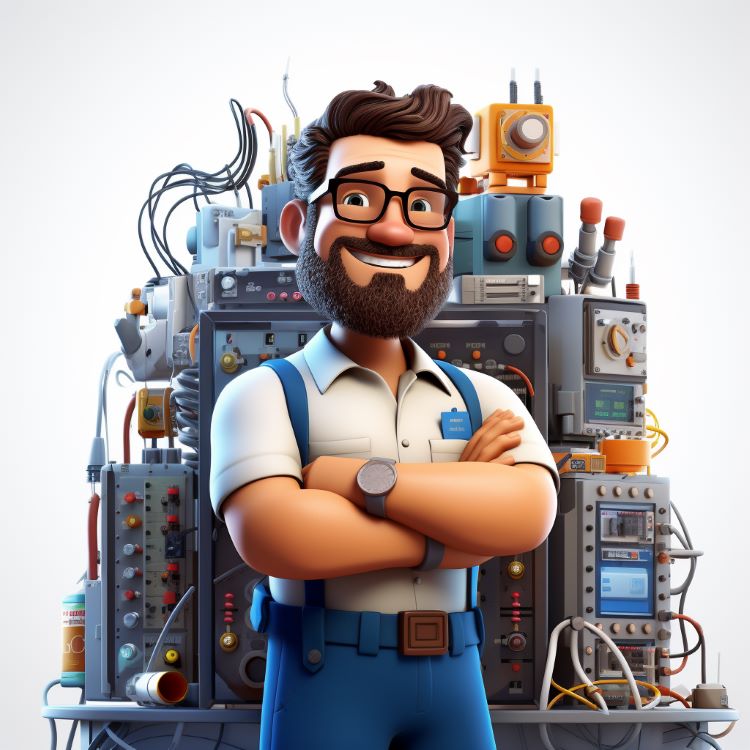Discover your engineering passion with our guide to India’s 11 most popular engineering branches. Learn subjects, career prospects and which one is right for you.

Do you love engineering? I always had a passion for engineering, and all things science ever since I was a kid. Learning about science subjects, doing experiments and watching documentaries were always my favorite things! And even now, I love my job after all these years.
Types of Engineering Branches
If you’re hoping to take up engineering but don’t know which branch will be suitable for you, here’s my ULTIMATE guide to the top engineering branches in India. I know there are so many to choose from (actually it mostly depends on what you get), but this is your guide on how to choose the right one for you! These 11 engineering branches are the most popular, and I have included info about the types of jobs in each, demand, subjects you’ll be studying, skills you’ll need for them and what types of students they are for.

Let’s go!
1. Mechanical Engineering
Building the World One Gear at a Time
Mechanical Engineering is the art and science of designing, developing, and maintaining mechanical systems that drive our world. It’s one of the most coveted engineering branches in India, often with a class including mostly male students! This branch of engineering that turns imagination into reality by creating everything from efficient machines to innovative technologies.

Subjects Studied: Mechanical Engineering branch has a vast curriculum including mathematics, physics, thermodynamics, fluid mechanics, materials science, and structural analysis. These subjects give students the knowledge and skills to tackle real-world engineering challenges.
Types of Jobs: Mechanical engineers can work in industries such as automotive, aerospace, energy, manufacturing, and robotics. Some roles include designing cutting-edge machinery, optimizing energy systems, or ensuring the structural integrity of buildings and bridges.
Who Is It Suitable For: Mechanical Engineering is perfect for those who have a natural curiosity for how things work and love to tinker with gadgets. It attracts those who enjoy problem-solving, hands-on work, and have a penchant for designing and building physical systems.
Qualities & Skills Required: Aspiring mechanical engineers need creativity, strong analytical skills, attention to detail, and the ability to work in teams. They should also have a solid foundation in mathematics and physics, as these are integral to solving complex engineering problems.
Career Prospects: In India, Mechanical Engineering graduates are in high demand across various sectors. The automotive industry, in particular, offers numerous opportunities for designing next-generation vehicles. Aerospace companies are constantly seeking skilled engineers for aircraft development. Energy companies look for expertise in optimizing power systems. With India’s manufacturing and infrastructure sectors booming, the demand for mechanical engineers continues to grow, making it a promising field for those aspiring to shape the future. Renowned companies like Tata Motors, Larsen & Toubro, and BHEL actively hire mechanical engineers. The growth prospects in India are solid, promising a rewarding career path.
2. Computer Science and Engineering (CSE)
Coding the Future with Algorithms, Enabling Tomorrow with Tech Dreams
Computer Science and Engineering (CSE) is where imagination meets technology. It’s often THE most popular branch in India and fills up the first in most colleges, also often the one offering highest packages. This branch empowers students to harness the power of computers and build the digital world we interact with every day. From developing cutting-edge software to ensuring cybersecurity, CSE professionals shape our digital future.

Subjects Studied: Students in Computer Science and Engineering study programming languages, algorithms, data structures, databases, artificial intelligence, and machine learning. These subjects equip them with the knowledge to craft innovative software solutions.
Types of Jobs: CSE graduates have a plethora of career options. They can work in software development, cybersecurity, data science, web development, and more. Some may create mobile apps that simplify our lives, while others may design complex algorithms for financial analysis.
Who Is It Suitable For: CSE is tailor-made for those who are passionate about technology, coding, and problem-solving. It’s one of the best engineering branches for those who thrive in a dynamic, ever-evolving environment and enjoy exploring the limitless possibilities of the digital world.
Qualities & Skills Required: Prospective CSE students should have strong analytical thinking, logical reasoning, and a knack for breaking down complex problems into manageable components. Creativity, adaptability, and teamwork are essential in a field where collaboration drives innovation.
Career Prospects: In India and even abroad, the demand for Computer Science and Engineering professionals is insatiable. The tech industry is booming, with sectors such as software development, cybersecurity, data analytics, and artificial intelligence experiencing rapid growth. Tech giants like Infosys, TCS, and Microsoft actively hire CSE graduates, offering diverse and rewarding career paths. The future of CSE in India looks exceptionally promising, with continued demand for tech-savvy individuals who can shape the digital landscape. As India continues its digital transformation, the opportunities in CSE are boundless.
3. Electronics and Communication Engineering (ECE)
Connecting the World, Signal by Signal
Electronics and Communication Engineering (ECE) is the backbone of our interconnected world (and it’s what I studied too!). It’s the field where innovation meets connectivity, enabling us to communicate, share data, and experience technology like never before. ECE professionals are the people behind the devices and networks that keep us connected.
Subjects Studied: ECE students dive deep into subjects like electronics, signal processing, communication systems, digital and analog circuits, and semiconductor devices. They gain a profound understanding of how electronic systems work and how to harness them for communication and innovation.
Types of Jobs: ECE graduates have lots of career avenues. They can work in telecommunications, semiconductor manufacturing, embedded systems development, and even research. From designing smartphones to optimizing network infrastructure, ECE professionals play important roles.
Who Is It Suitable For: ECE is an ideal choice for people who are fascinated by technology, gadgets, and how information travels through the digital ether. Perfect for those who enjoy tinkering with electronic devices and envision a connected future.
Qualities & Skills Required: Prospective ECE students should have a keen attention to detail, problem-solving abilities, and a passion for staying updated with rapidly evolving technology. Creativity in designing innovative solutions and excellent analytical skills are essential.
Career Prospects: In India, the demand for Electronics and Communication Engineering professionals is robust. Telecommunications, mobile technology, and IoT are thriving sectors. Companies like Samsung, Qualcomm, and Ericsson actively seek ECE graduates to drive innovation in communication technology. With India’s increasing digital connectivity, ECE professionals have a bright future. It is a rewarding career in shaping the world’s communication infrastructure.
4. Chemical Engineering
Transforming Elements, Enriching Lives
Chemical Engineering is the science of transforming raw materials into valuable products. It’s a branch of engineering that bridges the gap between chemistry and engineering, allowing us to create everything from pharmaceuticals to sustainable energy solutions. Chemical engineers shape the innovation in materials and processes.

Subjects Studied: Chemical Engineering subjects include thermodynamics, fluid mechanics, chemical kinetics, materials science, and process design. Students gain an in-depth understanding of chemical processes and how to optimize them for efficient production.
Types of Jobs: Chemical engineering graduates go on to work in pharmaceuticals, petrochemicals, environmental engineering, materials science, and more. Some may focus on developing sustainable energy solutions, while others may work on creating new materials for diverse applications.
Who Is It Suitable For: Chemical Engineering is ideal for those who have a fascination with chemistry and a desire to solve real-world problems. Those who enjoy working in laboratories, conducting experiments, and designing processes that make the world a better place.
Qualities & Skills Required: Prospective Chemical Engineering students should have a strong foundation in chemistry, analytical thinking, and attention to detail. They should have creativity, as they often need to find innovative solutions to complex problems. Additionally, teamwork and communication skills are important for collaborating with multidisciplinary teams.
Career Prospects: As India continues its development, the demand for chemical engineers is strong, making it a field with substantial growth potential. The pharmaceutical and petrochemical industries are constantly seeking skilled chemical engineers. Renowned companies like Reliance Industries, Tata Chemicals, and Dr. Reddy’s Laboratories actively hire graduates in this field. With a growing focus on sustainability, environmental engineering and renewable energy sectors offer exciting opportunities.
5. Electrical Engineering
Powering the Future, Sparking Innovation
Electrical Engineering is the conduit through which our modern world operates. It’s a dynamic branch of engineering that revolves around electricity, electronics, and electromagnetism. Electrical engineers are the creators of systems that power our homes, gadgets, industries, and the innovations that shape our future.

Subjects Studied: Students pursuing Electrical Engineering study subjects like circuit theory, electromagnetism, digital electronics, power systems, and control systems. They gain comprehensive knowledge of electrical systems and how to design and manage them.
Types of Jobs: Electrical engineering graduates can work in power generation and distribution, electronics design, telecommunications, and control systems. Some may focus on renewable energy, while others may design electronic devices or work on robotics projects.
Who Is It Suitable For: Electrical Engineering is perfect for individuals who are curious about how things work, especially electronics and electrical systems. It appeals to those who enjoy solving complex problems related to electrical circuits and have a passion for innovation.
Qualities & Skills Required: Prospective Electrical Engineering students need analytical thinking, attention to detail, and the ability to work with abstract concepts. Creativity is valuable, as electrical engineers often find new solutions to technical challenges. Strong mathematical skills are essential for understanding and designing complex electrical systems.
Career Prospects: With India’s growing need for electricity and technological advancements, the demand for electrical engineers is substantial. Sectors like power generation, manufacturing, telecommunications, and electronics manufacturing actively hire electrical engineering graduates. Companies like BHEL, Siemens, and Tata Power provide exciting career opportunities. As India continues to advance technologically and expand its infrastructure, electrical engineers will play an important role in shaping the future.
6. Civil Engineering
Building Dreams, Shaping Our World
Civil Engineering is the art and science of designing and constructing the physical infrastructure that defines our society. It encompasses the planning, design, and management of structures like buildings, roads, bridges, and water supply systems. Civil engineers are the architects of our cities, turning visions into reality.

Subjects Studied: Students in Civil Engineering immerse themselves in subjects such as structural analysis, construction management, geotechnical engineering, environmental engineering, and transportation engineering. They study the principles behind designing and maintaining various structures.
Types of Jobs: The career options for civil engineering graduates include working in construction management, structural engineering, transportation planning, environmental consulting, and urban development. Some may focus on designing sustainable infrastructure, while others may work on projects related to water resources or earthquake-resistant buildings.
Who Is It Suitable For: Civil Engineering appeals to people who are passionate about the physical environment, enjoy designing and building structures, and want to create solutions that benefit society. It’s an excellent choice for those who want to see tangible results of their work.
Qualities & Skills Required: Prospective Civil Engineering students need strong analytical skills, attention to detail, and the ability to work with complex data and designs. Effective communication, teamwork, and problem-solving skills are essential for collaborating with diverse teams and addressing engineering challenges.
Career Prospects: In India, construction and infrastructure sectors are continually growing, with great demand for skilled civil engineers. Sectors like real estate, transportation, and urban development actively hire civil engineering graduates. Renowned companies like Larsen & Toubro, Tata Projects, and Gammon India offer exciting career opportunities. As India continues to urbanize and develop its infrastructure, civil engineers will be shaping our cities and towns.
7. Aeronautical Engineering
Defying Gravity, Embracing the Skies
Aeronautical Engineering is the vanguard of human flight, where imagination soars to new heights. It’s one of the most specialized engineering branches, revolving around the design, development, and maintenance of aircraft and spacecraft. Aeronautical engineers enable human exploration beyond our planet and the creators of the marvels that take us to the skies. Because of their love for airplanes, most kids love Aeronautical engineering, making it a very competitive branch to get into. In fact, even my son wants to go for it!
Subjects Studied: Students of Aeronautical Engineering have to study subjects such as aerodynamics, aerospace propulsion, flight mechanics, aircraft structures, and avionics. They learn the principles governing flight and space exploration.
Types of Jobs: Aeronautical engineering graduates have a spectrum of career opportunities. They can work in aircraft design, aerospace manufacturing, aircraft maintenance and repair, or even venture into space exploration with organizations like ISRO or NASA. Some may focus on designing cutting-edge aircraft, while others may contribute to space missions.
Who Is It Suitable For: Aeronautical Engineering is the perfect choice for students who are passionate about flight, space exploration, and the science of aeronautics. It attracts those who dream of designing aircraft that push the boundaries of technology.
Qualities & Skills Required: Prospective Aeronautical Engineering students should possess a keen interest in physics and mathematics, as these are fundamental to understanding the principles of flight. Attention to detail, problem-solving abilities, and creativity in designing aerospace solutions are skills to have. Strong teamwork and communication skills are essential for collaborating with multidisciplinary teams.
Career Prospects: In India, the aerospace industry is growing steadily, with organizations like HAL, Boeing, and Airbus actively hiring aeronautical engineering graduates. Additionally, ISRO’s endeavors in space exploration continue to create demand for skilled professionals. As India’s aviation and space sectors expand, aeronautical engineers will be at the forefront of innovation, making it a field with substantial growth potential and numerous opportunities for those who aspire to explore the skies and beyond.
8. Environmental Engineering
Preserving Nature, Engineering the Future
Environmental Engineering is the steward of our planet, finding ingenious ways to harmonize human progress with environmental sustainability. This discipline addresses the complex challenges of pollution control, resource management, and sustainable development. Environmental engineers are the custodians of our ecosystem, working tirelessly to ensure a cleaner, healthier planet.
Subjects Studied: Subjects include environmental chemistry, water and wastewater treatment, air quality management, solid waste management, and sustainable engineering practices. Students acquire a deep understanding of the intricacies of natural systems and how to protect and restore them.
Types of Jobs: Environmental engineering graduates can work in water resource management, environmental consultancy, waste management, sustainable construction, or even with NGOs focused on environmental conservation. Some may concentrate on designing systems to purify water, while others may work on urban planning projects with a focus on sustainability.
Who Is It Suitable For: Environmental Engineering is a calling for students who are passionate about environmental conservation, sustainability, and making a positive impact on the planet. It attracts those who see engineering as a means to protect the environment and ensure a brighter, cleaner future.
Qualities & Skills Required: Prospective Environmental Engineering students should possess a deep concern for the environment, critical thinking skills, and an ability to apply scientific principles to practical problems. They should also be effective communicators, as they often need to convey complex environmental issues to diverse audiences.
Career Prospects: As India increasingly focuses on sustainable development, this is a great career path. Government initiatives like Swachh Bharat Abhiyan and pollution control measures have created a demand for skilled environmental engineers. Organizations like TERI (The Energy and Resources Institute) and environmental consultancies actively hire graduates in this field. As environmental awareness continues to grow, demand for environmental engineers will be good for those who want to protect and enhance our natural world.
9. Biotechnology Engineering
Unlocking Life’s Potential, Engineering Health and Science
Biotechnology Engineering is where science meets innovation, transforming the building blocks of life into solutions that improve health, food security, and the environment. This branch harnesses the power of biology and technology to create products, processes, and therapies that shape the future. Biotechnology engineers are experts in biomedicine, agriculture, and sustainable practices.
Subjects Studied: Students in Biotechnology Engineering study molecular biology, genetic engineering, bioinformatics, pharmaceutical technology, and microbiology. They learn about the intricate mechanisms of living organisms and how to manipulate them for beneficial outcomes.
Types of Jobs: Biotechnology engineering graduates go on to work in pharmaceuticals, biopharmaceuticals, agricultural biotechnology, healthcare, and research institutions. Some may focus on developing life-saving drugs, while others may work on genetic engineering projects to enhance crop yields.
Who Is It Suitable For: Biotechnology Engineering is perfect for those who are passionate about the life sciences, genetics, and the potential to solve real-world problems through innovation. It appeals to those who envision a world where technology intersects with biology for the betterment of humanity.
Qualities & Skills Required: Prospective Biotechnology Engineering students should have a keen scientific curiosity, analytical thinking, and an ethical mindset, as they often deal with sensitive biological materials. Strong research and problem-solving skills are essential for designing experiments and finding novel solutions to biological challenges.
Career Prospects: In India, biopharmaceutical industry is booming, and agricultural biotechnology holds a lot of promise. Companies like Biocon, Serum Institute of India, and Dr. Reddy’s Laboratories actively hire biotechnology engineering graduates. As India continues its advancement in healthcare, agriculture, and environmental sustainability, biotechnology engineers will play a pivotal role in shaping these sectors. The growth prospects in this field are big for those who aspire to engineer solutions that benefit life and the planet.
10. Artificial Intelligence (AI) Engineering
Pioneering the Future, Engineering Intelligence
Artificial Intelligence (AI) Engineering is at the forefront of technological innovation, where machines learn, reason, and adapt to perform tasks that were once solely in the realm of human intelligence. It’s the hot field these days, a field that explores the boundless possibilities of machine learning, data analysis, and automation. AI engineers create a smarter, more efficient world.
Subjects Studied: Students in AI Engineering learn subjects like machine learning, deep learning, natural language processing, data science, and computer vision. They study the algorithms and technologies that power intelligent machines.
Types of Jobs: AI engineering graduates can work in sectors such as data analytics, robotics, virtual assistants, autonomous vehicles, and healthcare. Some may focus on developing AI-driven applications for businesses, while others may work on enhancing the capabilities of smart devices.
Who Is It Suitable For: AI Engineering is ideal for students who are fascinated by the fusion of technology and intelligence, and who have a vision for how AI can revolutionize industries. It attracts those who thrive in a rapidly evolving field and aspire to create machines that can think, learn, and solve complex problems.
Qualities & Skills Required: Prospective AI Engineering students should have a strong mathematical foundation, critical thinking skills, and the ability to work with large datasets. Creativity in designing innovative AI solutions is crucial, as is a deep understanding of programming languages and algorithms. Effective communication skills are also essential for translating AI concepts to various stakeholders.
Career Prospects: In India, AI Engineering is one of the engineering branches with best career prospects in industries like finance, healthcare, e-commerce, and technology actively hire AI engineers to enhance their operations and customer experiences. Companies like Infosys, Wipro, and Microsoft are at the forefront of AI innovation and frequently hire AI engineering graduates. With India’s growing emphasis on digital transformation and AI adoption, the demand for AI engineers will continue to soar.
11. Automobile Engineering
Driving Innovation, Shaping Mobility
Automobile Engineering is the driving force behind the wheels of innovation, shaping the future of transportation. It’s a specialized field of engineering that focuses on designing, manufacturing, and maintaining vehicles that range from conventional automobiles to electric and autonomous vehicles. Automobile engineers are the creators of the vehicles that power our world.
Subjects Studied: Students of Automobile Engineering study automotive design, automotive electronics, vehicle dynamics, thermodynamics, and manufacturing processes. They acquire comprehensive knowledge of the intricate mechanisms that power vehicles.
Types of Jobs: Automobile engineering graduates have a wide spectrum of career options. They can work in automotive design and manufacturing, vehicle testing and quality control, automotive research and development, and even motorsport engineering. Some may focus on designing fuel-efficient engines, while others may work on the development of electric or hybrid vehicles.
Who Is It Suitable For: Automobile Engineering is one of the best engineering branches for individuals who are passionate about automobiles, fascinated by their mechanics, and driven to create innovative solutions that enhance vehicle performance and sustainability. It appeals to those who want to be at the forefront of the automotive revolution.
Qualities & Skills Required: Prospective Automobile Engineering students should have a deep interest in vehicles, strong problem-solving skills, and the ability to work with intricate mechanical systems. Attention to detail, creativity in design, and proficiency in computer-aided design (CAD) are essential qualities. Effective communication and teamwork skills are valuable for collaborating with cross-functional teams in the automotive industry.
Career Prospects: The automotive sector is one of the country’s largest employers, with companies like Tata Motors, Mahindra & Mahindra, and Maruti Suzuki actively hiring automobile engineering graduates. With the global shift towards electric and sustainable transportation, the demand for skilled professionals in this field is on the rise. As India continues to evolve its transportation landscape, automobile engineers will play a pivotal role in shaping the future of mobility. This is a great choice for those who aspire to drive innovation in the automotive world.
So I hope my guide to the top engineering branches was helpful in understanding a bit about them. Which one are you most interested in getting into? Let me know below in the comments.
All the best for your test prep and college counselling!

Rahul Ahuja is a Principal Consultant at Infosys Limited, Chandigarh. He has over 15 years of experience in Telecom, Content and Telematics Billing applications & packages in OSS/BSS domain and process management.
He has worked as a business analyst, domain expert and onsite/offshore lead for numerous billing projects related to implementation, testing and support both at offshore locations in India and onsite locations in UK, USA, New Zealand and Singapore. Rahul has been working with Infosys for the last 12 years. He won an award for best managed project for LexisNexis, US, and multiple awards for zero bench top work creator at Infosys. Prior to working in Infosys, Rahul worked for Tech Mahindra for 2 years and Siemens for 1 year. He is also certified as an Oracle BRM Implementation Specialist.
Originally from Chandigarh, Rahul has a B.Tech degree in Electronics & Communications from Kurukshetra University and an MBA from Symbiosis Institute of Telecom Management. In his free time, he enjoys painting, traveling and spending time with his two kids. He can be reached via email or on LinkedIn.